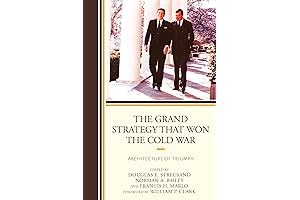· grand improvisation · 6 min read
Comprehensive Guide to Grand Improvisation by Derek Leebaert: 2024 Edition
Delve into Derek Leebaert's critically acclaimed work, Grand Improvisation: An in-depth analysis exploring America's foreign policy during the Cold War, spanning from 1945 to 1957.
Embark on an intellectual journey with Derek Leebaert's groundbreaking book, Grand Improvisation. This captivating work meticulously examines the intricate tapestry of American foreign policy during the defining era of the Cold War. Published in 2010, Grand Improvisation provides a comprehensive understanding of America's strategies and actions in confronting the formidable British superpower.
Overview

PROS
- Provides a comprehensive account of the complex diplomatic and political interactions between the US and UK during a pivotal period in history.
- Offers insightful analysis of the motivations and strategies of key figures, shedding light on the dynamics of international relations.
CONS
- Some readers may find the detailed historical narrative challenging to follow.
- While it explores the British perspective, it primarily focuses on the American viewpoint.
Derek Leebaert's 'Grand Improvisation' meticulously chronicles the multifaceted relationship between the United States and the United Kingdom in the aftermath of World War II. Drawing upon a wealth of archival research, Leebaert paints a vivid portrait of the diplomatic maneuvers, power struggles, and personal interactions that shaped this pivotal era.
Through a series of captivating anecdotes and incisive analysis, Leebaert illuminates the challenges and opportunities faced by both nations as they navigated the shifting global landscape. The book delves into key events such as the Truman Doctrine, the Marshall Plan, and the Suez Crisis, highlighting the intricate interplay between domestic politics, international ambitions, and the evolving balance of power. While primarily exploring the American perspective, Leebaert also provides valuable insights into the British viewpoint, offering a nuanced understanding of this complex relationship.

PROS
- Offers a captivating account of the strategic maneuvers that unraveled the Cold War.
- Provides a thought-provoking analysis of the complex interplay between statecraft, military might, and political ideologies.
CONS
- Could have included more in-depth exploration of the role of specific individuals.
- Some might find the focus on grand strategy less accessible than they hoped.
Derek Leebaert's The Grand Strategy that Won the Cold War: Architecture of Triumph is an engrossing narrative that delves into the intricacies of the Cold War's strategic landscape. Leebaert masterfully weaves together political maneuvers, military strategies, and ideological clashes to provide a comprehensive understanding of the United States' victory over the Soviet Union. His work sheds light on the architecture of triumph, meticulously crafted by policymakers and military leaders who navigated the tumultuous Cold War era.
The book's strength lies in its ability to convey the complexities of grand strategy in an accessible and thought-provoking manner. Leebaert explores the interplay between nuclear deterrence, containment, and détente, highlighting their impact on international relations and the eventual collapse of the Soviet bloc. Through a series of case studies and historical accounts, he demonstrates how the United States effectively exploited its strengths and capitalized on the weaknesses of its adversary. Leebaert's writing captivates readers, skillfully blending historical analysis with insightful commentary.

PROS
- Delves into the political intricacies of Truman's presidency.
- Paints a vivid picture of the challenges and triumphs of the post-WWII era.
CONS
- Some might find the narrative pacing too slow.
- The focus on domestic politics could leave some readers wanting more international perspectives.
In Derek Leebaert's captivating "Grand Improvisation," readers are transported back to the tumultuous era of Harry S. Truman's presidency. Leebaert offers a meticulous account of Truman's rise to power and his pivotal role in shaping post-World War II America. The book's title alludes to Truman's pragmatic approach, often involving improvisation and quick decision-making, in steering the nation through complex challenges.
Leebaert's writing is both erudite and accessible, providing valuable insights into Truman's character, his political motivations, and the inner workings of the Truman administration. Through a meticulous examination of primary sources and firsthand accounts, Leebaert sheds light on Truman's struggles, triumphs, and lasting impact on American history. While the book primarily centers on domestic politics, it effectively captures the complexities of the time, including Truman's role in the Cold War, the Korean War, and the establishment of the United Nations. "Grand Improvisation" serves as a comprehensive and engrossing account of Truman's presidency, providing readers with a deeper understanding of this pivotal figure in American history.
Derek Leebaert's Grand Improvisation masterfully dissects America's foreign policy during the Cold War. The book delves into the intricacies of diplomatic maneuvers, economic strategies, and military interventions employed by the United States to counter the influence of Great Britain. Leebaert's analysis illuminates the complexities of this era, shedding light on the motivations and consequences of American actions. This insightful work provides a nuanced understanding of a pivotal chapter in world history, offering valuable lessons for policymakers and students of international relations alike.
Frequently Asked Questions
What is the central theme of Derek Leebaert's Grand Improvisation?
Grand Improvisation explores the evolution of American foreign policy during the Cold War, examining the strategies and actions employed by the United States to counter the influence of Great Britain.
What is the significance of the title Grand Improvisation?
The title captures the complex and often unpredictable nature of American foreign policy during the Cold War. It suggests that the United States was forced to adapt and improvise in response to the rapidly changing global landscape.
How does Leebaert assess the effectiveness of America's Cold War strategies?
Leebaert argues that America's Cold War strategies were largely successful in containing the spread of Soviet influence. However, he also highlights the unintended consequences of these strategies, such as the escalation of the arms race and the erosion of civil liberties at home.
What are the key takeaways from Derek Leebaert's Grand Improvisation?
Leebaert's work offers valuable lessons for policymakers and students of international relations. It underscores the importance of strategic thinking, adaptability, and the need to consider the long-term consequences of foreign policy decisions.
How has Grand Improvisation contributed to our understanding of the Cold War?
Grand Improvisation has significantly deepened our understanding of the Cold War by providing a detailed and nuanced analysis of American foreign policy during this period. Leebaert's work has helped to shape the way historians and policymakers view this pivotal era in world history.






